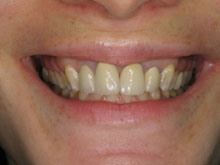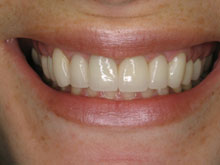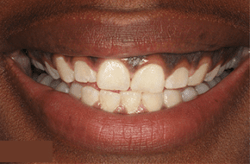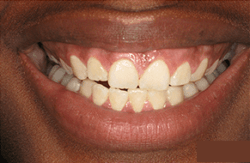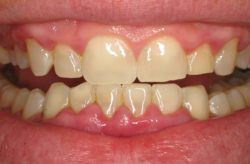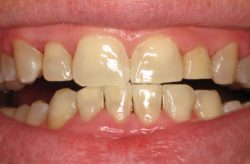What Causes Tooth Sensitivity in Gum Disease?

Tooth sensitivity in the context of gum disease is often a result of gum recession, a common manifestation as the condition progresses. Gum disease, marked by inflammation and infection of the gums, can cause the gums to recede, exposing the sensitive tooth roots. Normally protected by gums and enamel, these roots lack the same robust shielding, making them susceptible to external stimuli. When exposed, the dentin underneath, which contains microscopic tubules leading to nerve endings, becomes vulnerable. Consequently, triggers such as hot, cold, sweet, or acidic substances can stimulate these nerves, resulting in heightened sensitivity and discomfort. Understanding the causal link between gum disease and tooth sensitivity is crucial for effective management and targeted treatment, allowing individuals to alleviate discomfort and address the underlying issues for lasting oral health.
How does gum disease contribute to increased tooth sensitivity?

Gum disease significantly contributes to increased tooth sensitivity through a complex interplay of factors that impact the protective structures of the teeth. As gum disease progresses, inflammation and infection compromise the health of the gums, leading to a common symptom known as gum recession. When gums recede, the sensitive tooth roots become exposed, devoid of the protective enamel that shields the crowns of the teeth.
The exposed roots contain microscopic tubules that connect to nerve endings within the teeth. As a result, external stimuli such as hot or cold temperatures and sweet or acidic substances can directly stimulate these nerve endings, causing heightened sensitivity and discomfort. The compromised integrity of the gums and the exposure of vulnerable tooth roots are key contributors to increased tooth sensitivity in individuals with gum disease.
Addressing the underlying causes of gum disease through proper oral hygiene practices, professional dental treatments, and timely intervention is crucial to managing tooth sensitivity and preserving overall oral health. Regular dental check-ups are vital in early detection and effective management of gum disease-related tooth sensitivity.
How does plaque buildup or inflammation affect tooth sensitivity?
Plaque buildup and inflammation contribute significantly to tooth sensitivity by exacerbating the impact of gum disease on the teeth. Plaque, a sticky film containing bacteria, forms on the tooth surfaces and along the gumline. When plaque is not effectively removed through regular oral hygiene practices, it can harden into tartar, leading to inflammation and irritation of the gums.
Inflamed gums are more prone to recession, exposing the sensitive tooth roots. Furthermore, the inflammatory response can intensify the sensitivity of the nerve endings in the dentin, the layer beneath the enamel, making them more responsive to external stimuli. As a result, individuals with plaque buildup and inflamed gums are more likely to experience heightened tooth sensitivity.
Addressing this issue involves thorough dental cleanings to remove plaque and tartar and adopting proper oral hygiene practices to control inflammation. Additionally, professional treatments and interventions may be recommended to manage the underlying gum disease, preventing further progression of tooth sensitivity and promoting overall oral health. Regular dental check-ups are essential for early detection and effective management of plaque-related tooth sensitivity.
Are there other factors linked to gum disease that cause tooth sensitivity?
Several other factors linked to gum disease can contribute to tooth sensitivity, further complicating oral health. Poor oral hygiene practices, such as inadequate brushing and flossing, allow the accumulation of plaque and tartar, leading to gum inflammation and recession. Additionally, hormonal changes, especially in women during pregnancy or menopause, can make gums more susceptible to inflammation and sensitivity.
Bruxism, or teeth grinding, places excessive pressure on the teeth and gums, potentially exacerbating sensitivity. Certain systemic conditions like diabetes, which affects the body’s ability to fight infection, can also contribute to gum disease and heightened tooth sensitivity. Furthermore, lifestyle factors such as smoking or tobacco use can impair gum health, increasing the risk of sensitivity.
Understanding and addressing these interconnected factors through proper oral care, lifestyle adjustments, and professional dental interventions are crucial for managing tooth sensitivity linked to gum disease and promoting comprehensive oral well-being. Regular dental check-ups are vital in identifying and addressing these contributing factors to prevent further complications.

